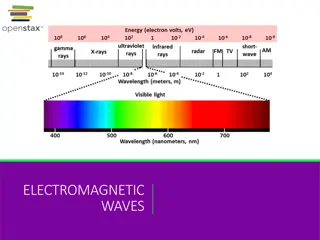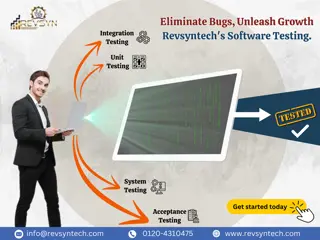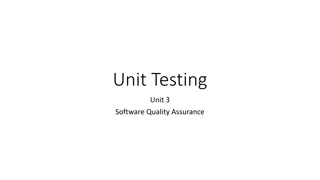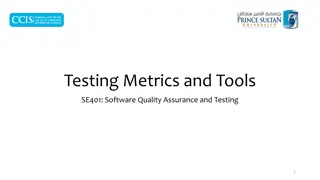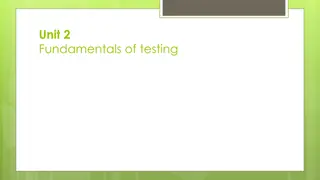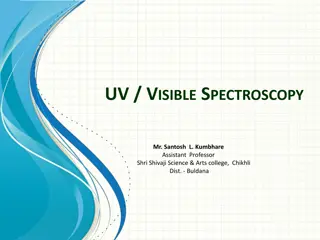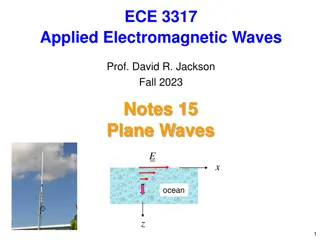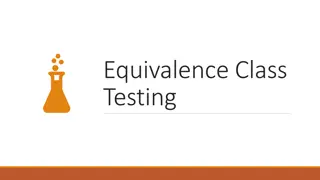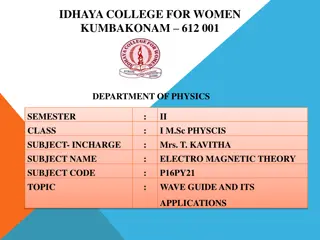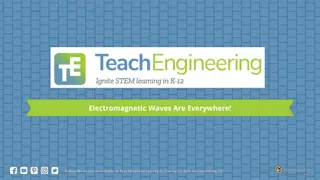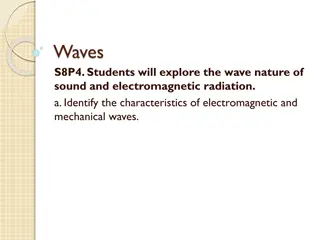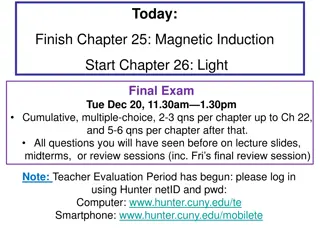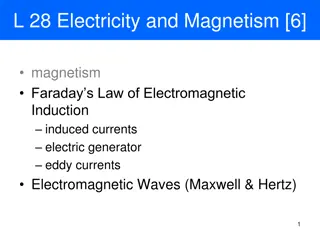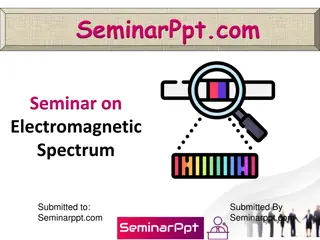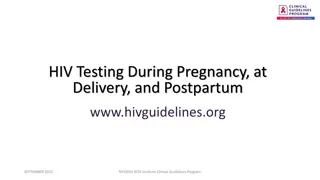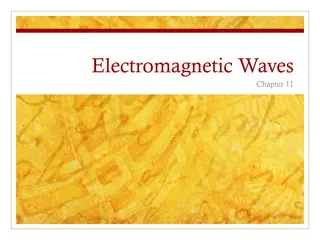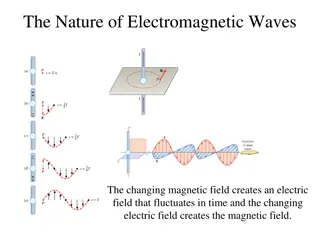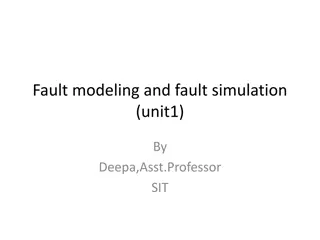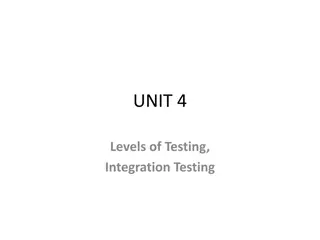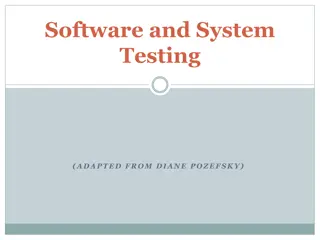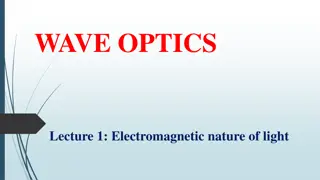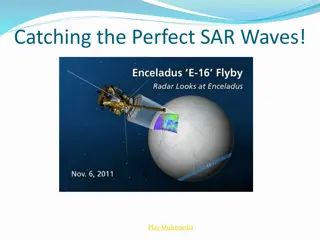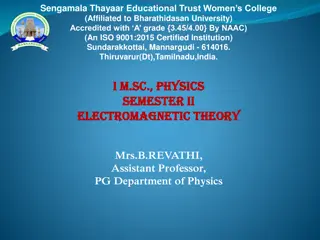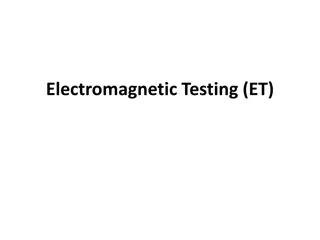Understanding Electromagnetic Waves: Maxwell's Contributions and Hertz's Observations
James Clerk Maxwell's groundbreaking work in the 19th century revealed the fundamental nature of light as an electromagnetic wave. His equations formed the basis for understanding the interplay between electricity and magnetism, predicting the existence of electromagnetic waves. Heinrich Hertz furth
4 views • 24 slides
Electromagnetic Surveying Methods and Applications
Electromagnetic surveying, conducted by Dr. Laurent Marescot, utilizes various methods like resistivity, induced polarization, and high-frequency techniques for exploration and investigation purposes. The electromagnetic method involves generating primary fields and detecting secondary fields to ana
2 views • 55 slides
Eliminate Bugs, Unleash Growth Revsyntech's Software Testing.
Unit Testing\nIntegration Testing\nSystem Testing\nAcceptance Testing\nEliminate Bugs and unleash Growth of Revsyntech's Software Testing.
2 views • 1 slides
Software Quality Assurance: Understanding Unit Testing and Boundary Value Testing
Unit testing is a crucial method in software development to ensure each part of the program behaves as intended. It helps detect problems early and provides a written contract for code quality. Additionally, Boundary Value Testing is a black box technique that focuses on input domain testing, with a
1 views • 49 slides
Understanding Electromagnetic Radiation and its Properties
This educational content delves into the arrangement of electrons in atoms, focusing on the properties of light and the electromagnetic spectrum, including the visible light spectrum. It explains wavelike behavior, wavelength, frequency, and their mathematical relationship, providing practice questi
0 views • 39 slides
Exploring the Electromagnetic Spectrum with Wavelengths Foldable
Explore the Electromagnetic Spectrum through a guided foldable activity that involves researching and labeling different wavelengths, comparing sizes, identifying longest and shortest waves, understanding frequencies, and providing examples of wavelengths from various sources such as radio broadcast
0 views • 13 slides
Understanding Software Testing Metrics and Tools
Software testing metrics play a crucial role in evaluating the quality and progress of the testing process. Metrics provide valuable insights into the readiness, quality, and completeness of a product. By measuring attributes such as defects, testing efficiency, and productivity, organizations can m
3 views • 100 slides
Fundamentals of Software Testing Explained
Software testing is a critical process to ensure that software applications meet requirements and are free of defects. It involves various activities such as test planning, analysis, design, implementation, and execution. Testing approaches like the Bing bang approach and Total Quality Management ar
1 views • 48 slides
Understanding UV/Visible Spectroscopy and Electromagnetic Radiation
Spectroscopy is the study of the interaction of matter with light, specifically UV and visible radiation. Electromagnetic radiation, consisting of photons, transmits energy through space as waves with oscillating electric and magnetic fields. The relationship between wavelength and frequency is key,
0 views • 50 slides
Understanding Electromagnetic Waves: A Comprehensive Overview
Introduction to plane waves, the electromagnetic spectrum, TV and radio spectrum, and a comparison of wired and wireless systems. Discusses the properties and applications of various frequency ranges within the electromagnetic spectrum. Highlights the efficiency of wireless systems over wired system
0 views • 37 slides
Understanding Equivalence Class Testing and Its Application in Software Testing
Equivalence class testing is a software testing technique that involves dividing input values into classes for effective testing coverage. Equivalence classes are defined mathematically as subsets of a given set, ensuring partitioning and mutual exclusivity. By applying equivalence partitioning, tes
1 views • 21 slides
Uganda's Successes in Reaching Men with HIV Testing Through Assisted Partner Notification Program
Uganda has successfully implemented an Assisted Partner Notification (APN) program to reach men for HIV testing, addressing the gender gap in testing rates. By utilizing various approaches such as index testing, self-testing, and social network testing, Uganda has achieved significant success in tar
0 views • 12 slides
Understanding Waveguides in Electromagnetic Theory
The concept of waveguides in electromagnetic theory involves the transmission of electromagnetic waves through hollow metallic tubes, such as rectangular and circular waveguides made from materials like copper and aluminum. These waveguides support different modes of propagation, including TE, TM, a
5 views • 15 slides
Unveiling the World of Electromagnetic Waves
Delve into the omnipresence of electromagnetic radiation with engaging activities that explore the characteristics of the electromagnetic spectrum, devices utilizing electromagnetic waves, and the mechanisms behind their functionality. Enhance your understanding by partaking in interactive learning
0 views • 7 slides
Software Testing Foundation Level: Testing Throughout the SDLC Quiz
Explore key concepts in software testing throughout the Software Development Lifecycle (SDLC) with a quiz covering topics like white-box testing in acceptance testing, component testing vs. system testing, and regression testing purposes. Enhance your understanding of testing methodologies with samp
5 views • 17 slides
Importance of Software Testing in Preventing Catastrophic Failures
Software testing is crucial in ensuring the reliability and safety of software systems, as highlighted by catastrophic failures such as the Ariane 5 rocket incident and the Therac-25 radiation therapy machine disasters. These examples underscore the importance of thorough testing in identifying and
1 views • 42 slides
Testing Approach in SCREAM for E3SM Fall All-Hands 2019
Major effort is focused on verification and testing in SCREAM for the E3SM Fall All-Hands. The initiative includes unit testing, property testing, regression testing, and leveraging various tools like Cmake, Python, Jenkins, AutoTester, and GitHub for Continuous Integration (CI). The emphasis is on
1 views • 21 slides
Understanding the Wave Theory of Light and Electromagnetic Spectrum
Explore the fascinating world of electromagnetic waves, visible light, and the wave theory through concepts such as wavelength, frequency, amplitude, and the speed of light. Understand how these elements are interconnected, and discover the diverse range of the electromagnetic spectrum. Dive into th
0 views • 77 slides
Testing in Space Simulation Facilities: A Comprehensive Analysis
This webinar delves into testing in space simulation facilities, comparing the requirements at different stages of space missions such as launch, cruise, and operations. Presented by Miracle Israel Nazarious, it covers topics including space qualification testing involving static load, vibration, th
0 views • 12 slides
Understanding Waves: Characteristics and Types Explained
Explore the wave nature of sound and electromagnetic radiation, distinguishing between electromagnetic and mechanical waves. Waves are energy-carrying disturbances that do not transport matter. Mechanical waves require a medium for energy transfer, while electromagnetic waves can travel through spac
0 views • 26 slides
Understanding Harmonics in Electromagnetic Environments
In the realm of electromagnetic environments, the generation of electromagnetic interference (EMI) through harmonics plays a crucial role. This article delves into the concept of harmonics, their generation in simple DC power supplies, and the impact they have on electronic devices. From the basics
0 views • 31 slides
Understanding Quantum-Mechanical Model and Electromagnetic Waves
Quantum-Mechanical Model delves into how electrons exist in atoms, shaping the chemical and physical properties of elements. It contrasts metals and non-metals, emphasizes noble gases' inertness, and explains the charges on ions. Additionally, it explores the similarities between electrons and light
0 views • 33 slides
Understanding Electromagnetic Waves and Their Velocity
Light, as a transverse wave, is a part of the electromagnetic spectrum produced by accelerating electrons. Electromagnetic waves originate from vibrating charges, creating a continuous cycle of electric and magnetic fields. The velocity of electromagnetic waves is constant due to energy conservation
0 views • 32 slides
Understanding Testing in Software Engineering
In the previous session, we discussed various aspects of software engineering, including modeling with UML diagrams, such as activity diagrams, use case diagrams, sequence diagrams, state diagrams, and class diagrams, as well as architecture patterns. Testing was emphasized as a key aspect, highligh
0 views • 35 slides
Understanding Gray Box Testing in Software Development
Gray Box Testing is a software testing technique that involves testing the software with partial knowledge of its internal workings. It combines aspects of White Box Testing and Black Box Testing, allowing testers to check both the presentation layer and the code part of an application. Gray Box Tes
0 views • 14 slides
Understanding Magnetism: Faraday's Law and Electromagnetic Induction
Explore the fascinating world of magnetism and electromagnetism with insights into Faraday's Law of Electromagnetic Induction, induced currents, and the basic principles of magnetism. Discover how a changing magnetic field can produce a current and unravel the key concepts behind electromagnetic wav
0 views • 24 slides
Understanding Spectrometry and Electromagnetic Waves
Spectrometry plays a vital role in analytical chemistry by studying the interactions of radiation and matter through electromagnetic waves. These waves, characterized by varying electric and magnetic fields, travel at the speed of light in vacuum with a constant velocity. The properties and characte
0 views • 24 slides
Understanding the Electromagnetic Spectrum: A Comprehensive Overview
The electromagnetic spectrum encompasses a vast range of frequencies and wavelengths of electromagnetic radiation. This seminar presentation delves into the definition, uses, significance, and formulas associated with the electromagnetic spectrum. Covering topics from radio waves to cosmic rays, it
0 views • 20 slides
Understanding Requirements-Based Testing in Software Development
Dive into the world of requirements-based testing in software development, exploring main concepts, test levels, testing roles, and the importance of testing your solution and modeling case. Learn about test cases, different testing activities, and the significance of acceptance testing in identifyi
0 views • 16 slides
Guidelines for HIV Testing During Pregnancy and Postpartum
These guidelines recommend HIV testing during pregnancy, at delivery, and postpartum. Testing should be done early in pregnancy and again in the third trimester. Expedited testing during labor is required for certain patients, and syphilis testing is recommended. Pre-exposure and post-exposure proph
0 views • 18 slides
Understanding Electromagnetic Waves: Essential Concepts and Applications
Electromagnetic waves are a fundamental aspect of physics, characterized by the transmission of energy through vibrating electric and magnetic fields. This comprehensive guide explores the production, properties, and applications of electromagnetic waves, shedding light on topics such as photon beha
0 views • 21 slides
Understanding Electromagnetic Waves: Speed, Spectrum, and Applications
Electromagnetic waves are characterized by the interplay between changing magnetic and electric fields, propagating at the speed of light in a vacuum. This speed, denoted by 'c,' is a fundamental constant. The electromagnetic spectrum encompasses a range of frequencies and applications, from radio a
0 views • 12 slides
Comprehensive Overview of Fault Modeling and Fault Simulation in VLSI
Explore the intricacies of fault modeling and fault simulation in VLSI design, covering topics such as testing philosophy, role of testing in VLSI, technology trends affecting testing, fault types, fault equivalence, dominance, collapsing, and simulation methods. Understand the importance of testing
0 views • 59 slides
Understanding Unit Testing in Software Engineering
Concept Software is a discipline comprising various code pieces. Testing these codes together is complex but vital in Software Engineering. The process includes early testing like unit tests, pairwise/multiple component testing, module testing, integration testing, user tests, alpha tests, beta test
1 views • 6 slides
Understanding Integration Testing and Levels of Testing
Explore the importance of integration testing in software development, covering topics such as traditional testing levels, the SATM system, goals and purposes of integration testing, testing level assumptions and objectives, software process overview, various approaches to integration testing, and t
0 views • 39 slides
Importance of Software and System Testing
Understanding the critical role of software and system testing in identifying and fixing errors before they lead to major failures. Various types of testing such as functional, usability, performance, and reliability testing are essential to ensure the quality of software products. Different classif
0 views • 52 slides
Understanding the Electromagnetic Nature of Light in Wave Optics
Exploring the electromagnetic properties of light, this lecture covers the dual nature of light as both a wave and particles, the quantized particle nature of light known as photons, and the manifestation of the electromagnetic nature of light through Maxwell's equations. It delves into wavefronts,
0 views • 8 slides
Understanding Electromagnetic Waves and Radar Systems
Dive into the world of electromagnetic waves and radar systems with detailed explanations on wave basics, the electromagnetic spectrum, radar technology, and applications in geometry. Discover how radio waves are used in radar systems and the importance of electromagnetic energy in modern engineerin
0 views • 13 slides
Understanding Electromagnetic Waves in Physics
Exploring the propagation of electromagnetic waves in different mediums such as free space and isotropic dielectrics. Discusses Maxwell's equations, wave equations, transverse nature, energy transmission, and impedance in electromagnetic wave propagation.
0 views • 24 slides
Understanding Electromagnetic Testing (ET) in NDT
Electromagnetic Testing (ET) is a crucial NDT method involving techniques like Eddy Current Testing (ECT) and Alternating Current Field Measurement (ACFM). It is used for crack detection, material thickness measurement, and more in various industries due to its sensitivity and immediate results. Des
0 views • 21 slides
